compassion: part I
On my last weekend in Togo, I visited a Compassion International site in Lome, the capitol city. I've been a spokesperson with Compassion for the past year, a non-profit whose mission is to "release children from poverty in the name of Jesus." They go into the poorest neighborhoods in the poorest developing countries and partner with a local church to create a community center for kids. Compassion gives money to the church, who employs local staff to run the program.
Kids come after school one or two days a week (or on Saturdays), and they receive a nutritious meal, tutoring, Bible lessons, mentoring and games. The Compassion workers at the site also do home visits, and provide food baskets and assistance to the poorest families in the program.
For $38/month, you can sign up to sponsor a child and get them the resources they need to eat well, finish school, and even go on to university. I've met kids who have gone all the way through the program and finished college. The difference that $38 and a sponsor who believed in them has made in their lives is unbelievable.
So anyway. It's a very cool organization, and while I was in Togo I had the chance to spend a Saturday at a site. Compassion flew in a videographer from the U.K. to capture some video of the day (which was awesome in and of itself, because when the staff at my hotel saw all his camera equipment, they assumed I was a movie star from America, and for the rest of my stay, they were very, very nice to me.)
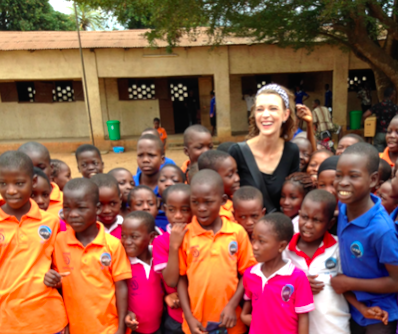
Ben (the videographer) and I went to the site where there were 240 children that day. The program is housed at the Assemblies of God church. On the lot, there's a large sanctuary, a small office building, and building of five classrooms. The classrooms have roofs and three walls. The fourth side is open, and looks onto the courtyard in between all the buildings, a dusty lot with a large tree in the center.
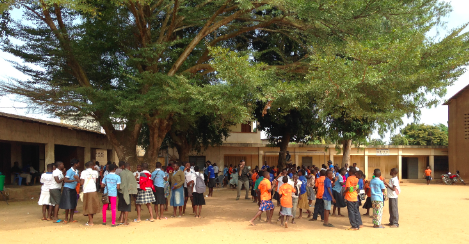
When we arrived, the director told us more about their program and about their kids. He said many come from families who can't afford a big enough house to sleep all their kids, so the oldest ones sleep under tables at the empty market at night, and scrounge for food in the trash.
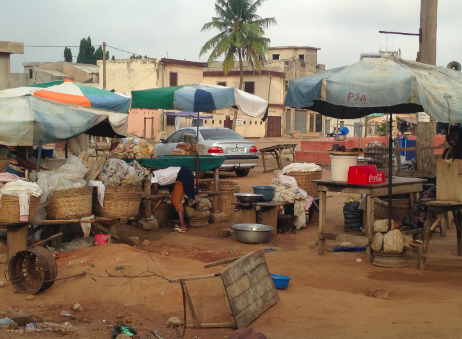
Then the director showed us the classrooms where the children had been divided by age. In one room, they were learning about nutrition. The Togolese teacher was telling them about including a piece of fruit or vegetable with each meal.
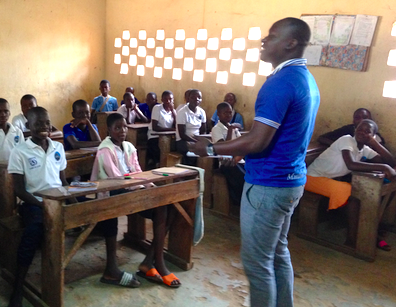
He quizzed the kids. "If you don't have any money to eat, what can you do?"
A 10-year-old boy raised his hand. "You can look on the ground for coins," he said.
The teacher nodded.
I thought back to the Somali family I met in Portland and how, when they had run out of money and out of food, the mom had taken her five daughters to empty parking lots and had them fan out, looking for spare change on the ground. When the couldn't find enough change on the ground, the mom had resorted to Dumpster diving behind the grocery store at night while her girls were sleeping. When I went over to the Somali family's house for the first time, the girls were eating moldy bread dipped in ketchup for dinner, because it's all the mom had been able to find in the trash.
The teacher asked his students, "What else could you do?"
An 11 year-old girl raised her hand. "Ask someone for money?"
The teacher nodded. He asked them another question: "What's the least expensive produce you can buy in the market?"
The right answer ended up being a banana, which apparently you can buy for less than a nickel.
In the next classroom, the students were learning about geography. The director took me to the front of the classroom and introduced me to the students. He asked if anyone had any questions for me.
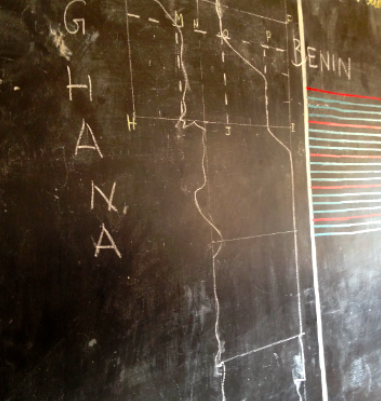
They asked me what I like to write about, what state I'm from in the U.S., if I'm married, and if I had kids.
When I told them no, I'm not married and I don't have kids, another student said he had a question.
"When do you think you might have a baby?" he asked.
I realized that in their culture, a woman who's not married and has no kids who's past the age of 20 is an anomaly.
"I don't know if I'll ever have a baby," I said. "But I'm so thankful that I have all of YOU as my friends!"
The director put his hand on my shoulder. "We have a surprise for you," he said. Then he turned to the class. "Felix, will you please stand?"
And then, in the second row of desks on my right, I saw a boy about 5 feet tall with a round face and warm eyes, stand up, looking at his feet instead of making eye contact with me.
"This is who you sponsor!" the director said. "This is him!"
I walked over to Felix and shook his hand. He was shy, and his voice was soft, barely above a whisper. I told him I was so privileged to meet him, and that I was proud of him for being in the program -- especially on a Saturday when he could've been playing soccer.
Class finished a few minutes later, and the director, Felix and I stood at the front, chatting. The director prompted Felix to ask me a question. In his quiet voice, he asked, "Do you want to come to my house?"
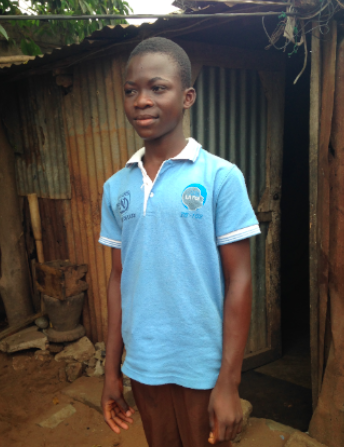
***
p.s. Want to sponsor a child with Compassion International? (please say yes!!!)
Click here to visit their website and begin a life-changing relationship with a child.
p.p.s. If you're wondering what I said to Felix....of course I said yes! I'll write about visiting Felix's home in the next post.